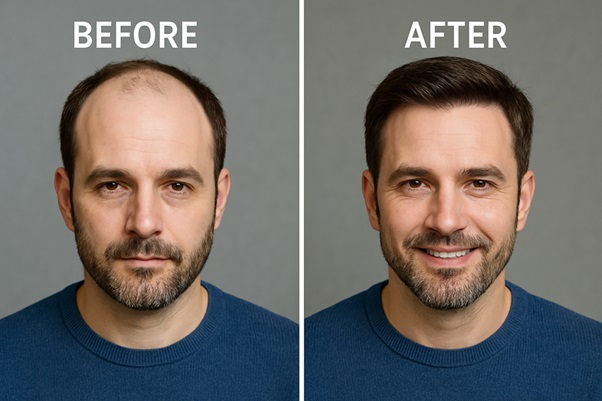A successful hair transplant not only restores lost hair but also enhances confidence and self-image. However, achieving optimal results requires patience, proper care, and expert guidance. Hair restoration is a gradual process, and understanding how to maximize hair transplant results can help ensure strong hair growth and improved density.
From post-transplant care to nutritional support and complementary treatments, various factors influence the effectiveness of a hair transplant. By following the right aftercare routine, you can accelerate recovery, strengthen transplanted follicles, and achieve long-lasting, natural results.
What to Expect After a Hair Transplant?
The journey to full hair transplant results occurs in multiple stages. Understanding what happens at each phase can help manage expectations and ensure proper post-procedure care.
- First Few Weeks: Mild swelling and scabbing may appear as the scalp heals. This is completely normal and part of the body’s natural recovery process.
- 1 to 3 Months: Transplanted hair may shed temporarily, a phase known as shock loss, before new growth begins.
- 4 to 6 Months: New hair starts to grow, gradually increasing thickness and coverage. At this stage, results become noticeable, but full density is still developing.
- 9 to 12 Months: Full hair transplant results are typically achieved, with natural-looking and long-lasting hair growth. The hair continues to thicken over time, creating a fuller and more voluminous appearance.
Why Proper Aftercare is Crucial
To ensure the best outcome, selecting an advanced hair transplant procedure is essential. Modern techniques such as FUE hair transplant provide minimally invasive solutions with precise follicle implantation and natural hair regrowth.
Tips to Maximize Hair Transplant Results
While hair transplantation offers a permanent solution, maximizing growth and density requires a strategic approach. Here are essential steps to follow:
1. Follow Post-Procedure Care Instructions
After a hair transplant, the scalp needs time to heal. Proper aftercare plays a crucial role in ensuring strong follicle survival and sustained hair growth.
- Avoid direct sun exposure for a few weeks to prevent damage to healing follicles.
- Refrain from scratching, touching, or rubbing the scalp, as this can dislodge grafts and slow down healing.
- Use prescribed medications and mild shampoos to reduce inflammation and support hair growth.
- Sleep with your head slightly elevated during the initial days to minimize swelling.
- Avoid strenuous physical activities for at least two weeks to prevent excessive sweating that may affect healing.
2. Support Hair Growth with PRP Therapy
Platelet-Rich Plasma (PRP) therapy is a non-surgical treatment that enhances hair growth by stimulating follicles and improving blood circulation to the scalp.
- PRP therapy nourishes hair follicles, strengthening transplanted hair and improving density.
- It reduces post-transplant shock loss and accelerates regrowth.
- The treatment boosts hair quality, making strands thicker and stronger.
PRP therapy is often recommended after a hair transplant to speed up the recovery process and maximize results. If you’re considering PRP for enhanced growth, explore PRP & GFC therapy for better hair restoration outcomes.
3. Maintain a Healthy Diet
A nutrient-rich diet plays a key role in improving hair density and strengthening hair follicles. Consuming the right foods ensures optimal hair health and reduces post-transplant shedding.
- Protein-rich foods (eggs, fish, chicken, lentils) support keratin production, the building block of hair.
- Iron-rich foods (spinach, red meat, nuts) prevent hair thinning caused by anemia.
- Biotin and vitamin B complex (avocados, almonds, sweet potatoes) enhance hair strength and growth.
- Omega-3 fatty acids (salmon, walnuts, flaxseeds) keep the scalp moisturized and healthy.
- Zinc and vitamin D (dairy products, mushrooms, fortified cereals) help in hair follicle regeneration.
A well-balanced diet not only improves hair growth but also prevents further hair loss.
4. Stay Consistent with Hair Care
To maintain long-term hair transplant results, adopting a healthy hair care routine is crucial.
- Avoid excessive heat styling, chemical treatments, and harsh hair products, as they can weaken hair.
- Use sulfate-free, gentle shampoos that cleanse without stripping natural oils.
- Massage the scalp regularly to promote blood circulation, encouraging stronger hair growth.
- Keep your hair hydrated by using lightweight, nourishing hair oils like coconut or argan oil.
- Avoid overwashing your hair, as excessive washing can make strands brittle and prone to breakage.
Following a dedicated hair care routine helps protect and strengthen transplanted hair, ensuring lasting results.
5. Be Patient and Monitor Progress
Patience is key when it comes to hair transplant results. The full transformation takes time, and hair density continues to improve over 12 to 18 months.
- Stay committed to post-transplant check-ups to monitor progress and make adjustments if necessary.
- Take progress photos to track hair growth over time.
- Follow up with your hair transplant specialist for expert guidance.
If you have any concerns about your post-procedure recovery, feel free to contact us for personalized advice.
Is a Hair Transplant Right for You?
A hair transplant is an excellent option for individuals experiencing hair thinning or baldness with sufficient donor hair.
- If you’ve tried other treatments without success, hair transplantation provides a long-term solution.
- If you’re looking for natural-looking, permanent hair restoration, a transplant is the best choice.
- If your hair loss affects self-esteem and confidence, a transplant can help you regain a fuller and healthier look.
Take the Next Step Toward Hair Restoration
Looking to restore your hair naturally and permanently? The earlier you address hair loss, the better the outcome.
Book a consultation to explore the best treatment options tailored to your needs.
Learn more about our expert hair transplant services by visiting our homepage.
Have questions? Contact us today for expert guidance on your hair restoration journey.



